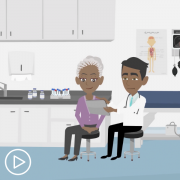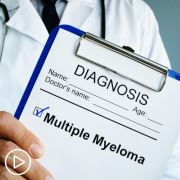What Key Questions Should Myeloma Patients Ask About Treatment?
What Key Questions Should Myeloma Patients Ask About Treatment? from Patient Empowerment Network on Vimeo.
Myeloma expert Dr. Rafael Fonseca shares specific questions that patients should ask about their treatment plan, and explains how to ensure optimal care for specific myeloma subtypes.
Dr. Rafael Fonseca is the interim director of Mayo Clinic Cancer Center and serves as the director for Innovation and Transformational Relationships at Mayo Clinic in Arizona. Learn more about Dr. Fonseca here.
Related Programs:

|

What Can Newly Diagnosed Myeloma Patients Expect When Starting Treatment? |

|
Transcript:
Katherine:
What sort of questions should patients consider asking about their treatment plan?
Dr. Fonseca:
I think it’s important that patients understand a few things. They can be described in multiple ways. Number one is, of course, what? What is it that is being used? I think that includes a description of what to expect, the practicalities, the names of the medications, their side effect profile, and what to report when you use those medicines. I think that’s very important because if you’re empowered with that information, you’re going to be better off as you react for symptoms that may come along. I always tell patients when you have a cancer diagnosis, your self-awareness goes through the roof because we’re going to be paying attention to everything, every skin change, every pain we have.
So, I think having a bit of that proactive discussion becomes important as they think about the treatments that they want. I think the how-to on the practicalities are very important. The best where the nursing team and the pharmacists help us a lot too. Do you take the medicines at night? Do you take them with meals? Is there something that you shouldn’t be mixing? How much time would it take for me to get a refill? It’s different to get a medication from a specialty pharmacy versus your down-the-street Walgreens. So, all of those things are important that patients, again, participate in the understanding.
If not them, at least the caregivers that are a part of this team. I think it’s important that patients ask also some brief descriptions of (A) the biology of the disease. If I have myeloma, what type of myeloma do I have? Does that matter as far as what treatments I’m going to be using? What treatment options may be available to me because of my specific subtype? We have subsets of myeloma that have options that are not available to others.
Also, I think it’s important that patients also ask a sense from the physicians as to where they are. I’d like to describe this a little bit more. Sometimes, patients ask us specific questions about, am I in a complete response? Am I in a very good partial response? What is a PFS? Those terms work very well when we talk about clinical trials, but they don’t necessarily describe in a great way the situation for an individual patient. I’d use a lot more objectives than I’d use technical terms when I describe where patients are. I say, “You have an excellent response. You have a very deep response.”
Then I’d provide more details if they want. “Yes, you’re MRD-negative at 10 to the -6.” But sometimes I find that it’s harder for patients to understand where they are if they completely focus on the staging system or the response criteria, etc.
Because maybe a VGPR, a very good partial response, doesn’t sound very good.
But then you can be in a very good partial response for 15 years and it doesn’t matter. You my want to be in an MRD-negative status, but you still have a good outcome. That’s why the general description of the status by a physician becomes important.
Katherine:
Do you think patients should get a second opinion consult with a specialist?
Dr. Fonseca:
In general, my answer is going to be yes. This is not self-serving. I think myeloma has become so complex that trying to integrate at least once, or if not, in some infrequent basis, an opinion of a myeloma specialist becomes important. This is no one’s fault. If you’re a community oncologist somewhere where myeloma represents only a small fraction of your practice, I can guarantee you, you cannot stay on top of the literature. I cannot stay up with everything that goes on with myeloma, even though that’s what I do 100 percent of the time.
I get an email every week with all the articles, all the publications, and I have to integrate that. I have to think, okay, does this matter or not? I go to the professional meetings. I see all the abstracts and I still feel like I’m missing out. How could you do that if that is only a small fraction of your practice? I’m sure that the same applies for other cancers, breast and colon. You can’t move. You cannot uproot yourself and leave your community and your family, but I think there should be ways by which patients at least have an opinion from someone who has more expertise. Fortunately, there are many centers across the nation now that have that expertise for the management of myeloma.



